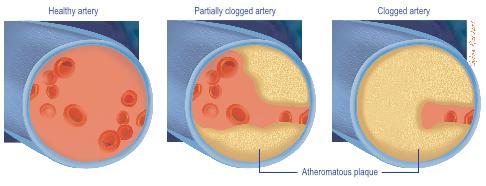How does cholesterol affect the arteries?
Excess cholesterol (particularly low density or “bad” cholesterol) deposits itself along the walls of arteries and can clog them up.
The fatty deposits thicken to form plaques on the walls of arteries, especially those of the heart (coronary arteries), the neck (carotid arteries), and the legs (iliac and femoral arteries).
Even if the artery is not completely blocked, blood circulation becomes difficult because of the narrowing of the vessels. When turbulence in the flow of blood occurs, small blood clots form. These blood clots, carried by the blood, can travel and block smaller blood vessels further along.
In the heart, this can cause coronary insufficiency (heart attack, angina).
In the brain, it can cause a cerebrovascular accident or stroke.
In the legs, it can cause decreased blood flow known as claudication.
How can I reduce the risks?
If you have a high cholesterol level, the first line of treatment is a dietary change to reduce your cholesterol intake. Limit consumption of foods that increase the bad (LDL) cholesterol level: cheese, whole milk dairy products, butter, fresh cream, red beef, offal, eggs, processed meats, pastries, chocolate and sweets.
Seek out food sources that contain good (HDL) cholesterol (oily fish, for example), fibre to help in digestion and the elimination of fat (vegetables, fruits, whole grain cereals) and use margarines rich in polyunsaturated fats.

High cholesterol increases the risk of cardiovascular disease. Changing your diet can decrease this risk significantly.
ABBEY FIGURES
| GENERAL PRACTITIONERS | 4 |
| REGISTRAR | 1 |
| NURSES | 3 |
| STAFF MEMBERS | 13 |
| CONSULTATION ROOMS | 6 |
| SURGICAL ROOMS | 1 |
OPENING HOURS
| Monday – Friday | 9:00 – 13:00 |
| 14:00 – 17:30 |
